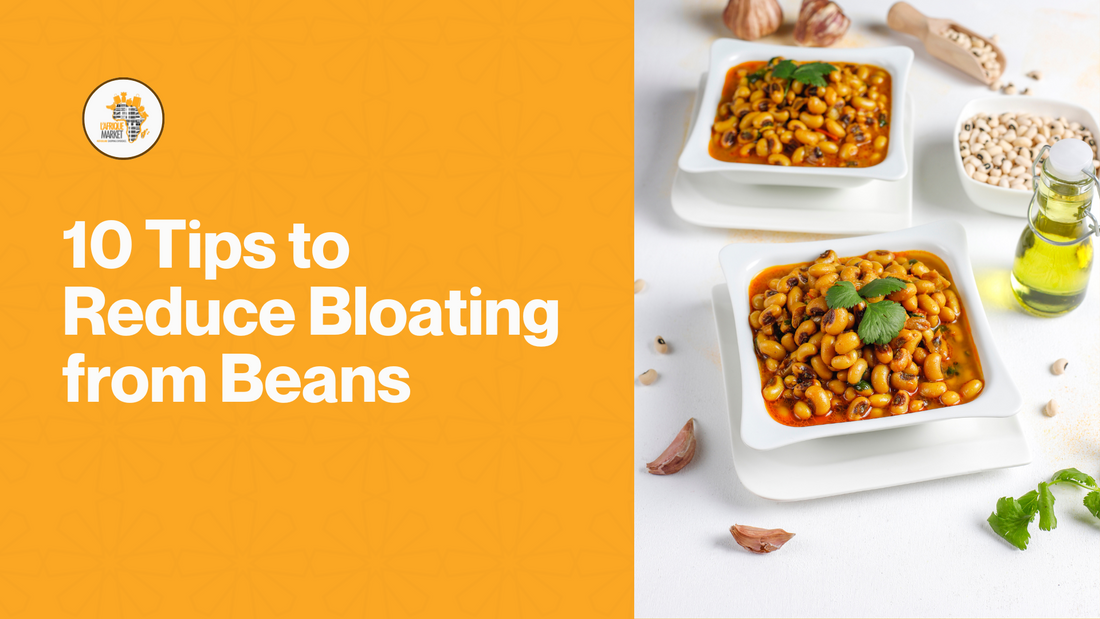
10 Tips to Reduce Bloating from Beans
Share
Beans are nutritious, affordable, and central to many African and global cuisines. Yet, for many, a satisfying bean dish can be followed by uncomfortable bloating and gas. If you love beans but want to ease their aftereffects, you’re not alone—and there are proven strategies to help your body adjust.
Why Beans Cause Bloating
Beans are high in:
- Fiber: Especially soluble fiber, which is fermented by gut bacteria and creates gas.
- Oligosaccharides: Complex sugars that our digestive enzymes can’t fully break down, so they travel to the colon, where bacteria ferment them—producing gas and bloating.
- Phytates and enzyme inhibitors: Which can be hard on the digestive system unless properly processed.

Image from: Tasty Ever After
Simple, Effective Ways to Reduce Bean Bloat
1. Soak Your Beans
- Soak dried beans overnight (at least 6-12 hours; chickpeas benefit from up to 24 hours). This leaches out some of the indigestible sugars and lectins that contribute to gas.
- Change soaking water once or twice and always discard it before cooking. Rinse beans well.
- Pressure cooking beans is also effective, as the heat breaks down more indigestible compounds.
Also read: The Role of African Herbs and Natural Remedies in Everyday Wellness
2. Cook Beans Thoroughly
- Ensure beans are cooked until soft, never eat them undercooked. Soft beans are easier to digest, and cooking destroys problematic lectins.
- Cooking with a pressure cooker or adding a small amount of baking soda or kombu/seaweed can help break down gas-producing compounds.
3. Rinse Canned Beans
- Drain and rinse canned beans well to remove excess salt and gas-causing carbohydrates present in the canning liquid.
4. Start Small & Build Up Slowly
- If your diet isn’t high in fiber, start with small servings (2–4 tablespoons per meal) and slowly work up to larger portions over a few weeks. This gives your gut time to adapt and trains your digestive system to better handle beans.
5. Choose Your Beans Wisely
- Some beans are naturally easier to digest than others. Lentils, mung beans, and black-eyed peas tend to cause less gas than soybeans, kidney beans, or navy beans.
- Try different varieties and see what works best for you.
6. Use Digestive Spices and Herbs
- Add spices such as ginger, cumin, turmeric, bay leaf, epazote, or asafetida (hing) during cooking—these are traditional aids for making beans gentler on the belly.
- Kombu seaweed is also popular in both African and Asian cuisines for improving digestibility.
7. Drink Enough Water
- High-fiber foods like beans require more water for comfortable digestion. Make sure to stay hydrated throughout the day, not just at mealtime.
- Some experts recommend sipping water outside of meals rather than during, to avoid diluting digestive juices—find what works for you.
8. Try Enzyme Supplements
- Products containing alpha-galactosidase (such as Beano) can help break down the difficult sugars in beans and reduce gas. These are widely available over the counter.
9. Consider Your Food Combinations
- Pairing beans with other high-fiber or gas-producing foods (like cruciferous vegetables or onions) can intensify discomfort for some people. Try eating beans with simple grains or vegetables at first, and experiment as your tolerance improves.
10. Regular Consumption Helps
- Regular, consistent bean consumption helps your gut microbiome adjust and can lead to less bloating over time. Within a few weeks, many people find their symptoms significantly reduced.
Quick Tips to Reduce Bloating from Beans
Final Thoughts
Bloating from beans is common, but with simple preparation steps and a little patience, you can enjoy all their health benefits without discomfort. Soaking, rinsing, and slow adjustment are the cornerstones, and adding spices or digestive enzymes offers further relief. Remember: your gut will adapt, and regular bean-eaters often experience less bloating over time. Enjoy beans confidently as part of a healthy, fiber-rich African-inspired diet!
